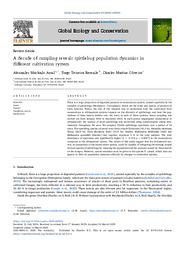A decade of sampling reveals spittlebug population dynamics in different cultivation system.
A decade of sampling reveals spittlebug population dynamics in different cultivation system.
Author(s): AUAD, A. M.; RESENDE, T. T.; OLIVEIRA, C. M. de
Summary: There is a large proportion of degraded pastures in monoculture system, caused especially by the complex of spittlebugs (Hemiptera : Cercopidae), which are the main pest insects of pastures in Latin America. Hence, the aim of the research was to understand how the conversion from monoculture to silvipastoral systems impacts on the diversity of spittlebugs, and how the populations of these insects behave over the years in each of these systems. Insect sampling was carried out from January 2010 to December 2019. In each system (signalgrass monoculture or silvipastoral), the capture of adult spittlebugs was performed using entomological sweep nets, randomly throughout the area. We sampled 23,040 spittlebugs specimens over a period of 10 years. The spittlebug species collected were Deois schach (Fabricius) (45.3 %), Notozulia entreriana (Berg) (26.8 %), Deois flavopicta (Stål) (24.9 %); besides, Mahanarva fimbriolata (Stål) and Mahanarva spectabilis (Distant) that together represent 3 % of the total samples. The total abundance of specimens was significantly higher (Z = -3.129, p = 0.0017) in the monoculture compared to the silvipastoral system. The results of this study suggest that the silvipastoral system, in comparison to the monoculture system, could be capable of mitigating the damage caused by most species of spittlebugs by reducing the population and the pressure caused by these insects on the forages. However, special attention must be given to the species D. schach, which does not appear to have its population dynamics affected by changes in cultivation systems.
Publication year: 2025
Types of publication: Journal article
Unit: Embrapa Dairy Cattle
Observation
Some of Embrapa's publications are published as ePub files. To read them, use or download one of the following free software options to your computer or mobile device. Android: Google Play Books; IOS: iBooks; Windows and Linux: Calibre.
Access other publications
Access the Agricultural Research Database (BDPA) to consult Embrapa's full library collection and records.
Visit Embrapa Bookstore to purchase books and other publications sold by Embrapa.

